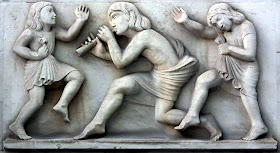 I've never really liked Broadcasting House. It looms up behind All Souls, the fake transmitter tower mocking Nash's eccentric but lovely spire. And (have I mentioned this before?) it is one of the most egregious sinners in the rape of Portland Place.
I've never really liked Broadcasting House. It looms up behind All Souls, the fake transmitter tower mocking Nash's eccentric but lovely spire. And (have I mentioned this before?) it is one of the most egregious sinners in the rape of Portland Place.But it does feature some great sculpture, notably by Eric Gill who did the mighty figure of Prospero holding a figure of Ariel above the front door. Why the magician and control freak Prospero and his invisible enforcer Ariel were considered particularly appropriate as symbols of the new BBC is something of a mystery.

Being Gill, stories of the creation of this work abound, notably that Gill carved it in situ, standing on the scaffold wearing a monk's habit and no underwear, so passing ladies got an eyeful of his mason's tools. Also that he gave Ariel a monster wang and had to carve a few inches off it on the personal instructions of Lord Reith.
Be that as it may, the sculpture clearly has religious overtones. Ariel is posed in a crucifix pose, and there are even suggestions of stigmata in the feet.
On the Portland Place front, two more bas-reliefs of Ariel depict "Ariel between wisdom and gaiety" and "Ariel hearing celestial music".
Not by Gill but probably designed by the architect, Lt Col Val Myers, is this remarkable depiction of The Golden Snitch of Harry Potter.




"Why the magician and control freak Prospero and his invisible enforcer Ariel were considered particularly appropriate"
ReplyDeleteFrom Wikipedia:
Their choice was fitting since Prospero was a magician, and Ariel, a spirit of the air, in which radio waves travel. There was, reportedly, controversy over some features of the statues when first built and they were said to have been subsequently modified[the controversial feature was apaprently Ariel's penis, which was more or less removed in order to protect delicate sensiblities!] . They were reported to have been sculpted by Gill as God and Man, rather than simply Prospero and Ariel, and that there is a small carved picture of a beautiful girl on the back part of Prospero's statue. Other sources claim that Gill intended them as God the Father and Son, as supported by the fact that the statue of Ariel bears stigmata.
Very funny :) Broadcasting House was opened in 1932 and Gill died in 1940. So he wasn't THAT old when the sculptural works were commissioned and created. But even for a religious man, his Rasputin-like behaviour must have shocked the good citizens of London, going about their daily business ha ha.
ReplyDeleteOne of the architects was Serge Ivan Chermayeff, a hero of mine and partner of Erich Mendelsohn. Just have a look at De La Warr Pavilion in Bexhill ( http://melbourneblogger.blogspot.com/2009/08/bauhaus-in-britain-chermayeff-and.html ). No wonder Broadcasting House got such a Deco look in its architecture and its sculpture.
Thanks for the input, EPB. I understand the reasoning but it is still a bit thin. Much more plausible is that Lord Reith, who was possessed of one of the largest egos in history, regarded himself as Prospero and the BBC as his slave.
ReplyDeleteAnd thank you Hels. Most of the notable architects of the day seem to have been involved at one point or another, including Wells Coates, the Australian Raymond McGrath and Edward Maufe. Such a pity they chose such a sensitive site for such an enormous building.
ReplyDeleteI think the Reithian ego might have been even bigger than you suggest, Chris. One interpretation of The Tempest is that Prospero is in part a personification of Shakespeare, the mage-like artist who, through the power of his art, brings enlightenment to us all; Prospero renouncing his art at the end of the play is like Shakespeare going into retirement, The Tempest being his last play as sole author. Of course it's an interpretation that lays aside the dodgy side of Prospero, but in Reith's time people were more inclined to see it this way than we are now, in these post-colonial times. Anyway, in this view of things, Reith sees himself as a Shakespeare-like figure, dispensing culture to the masses and filling the island full of enlightening noises. Which makes us all Calibans, I suppose. Oh dear..
ReplyDelete